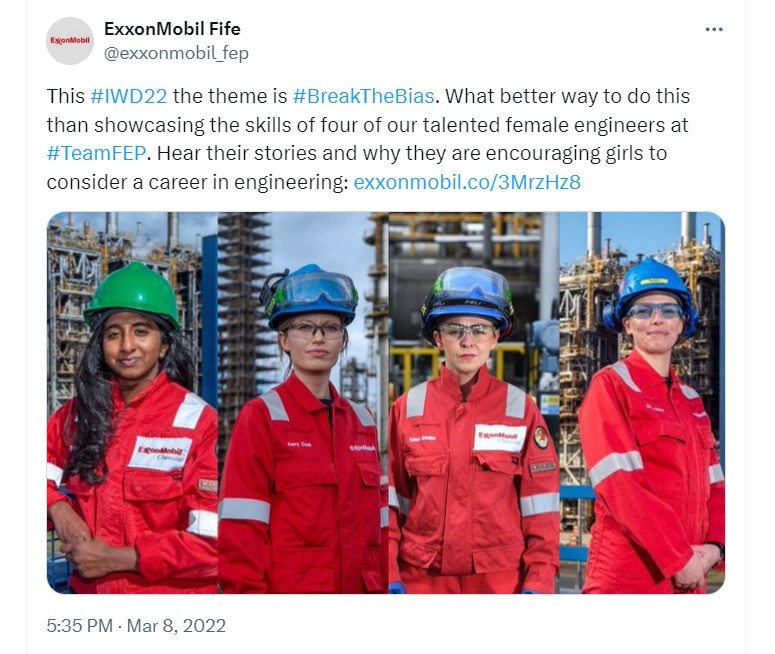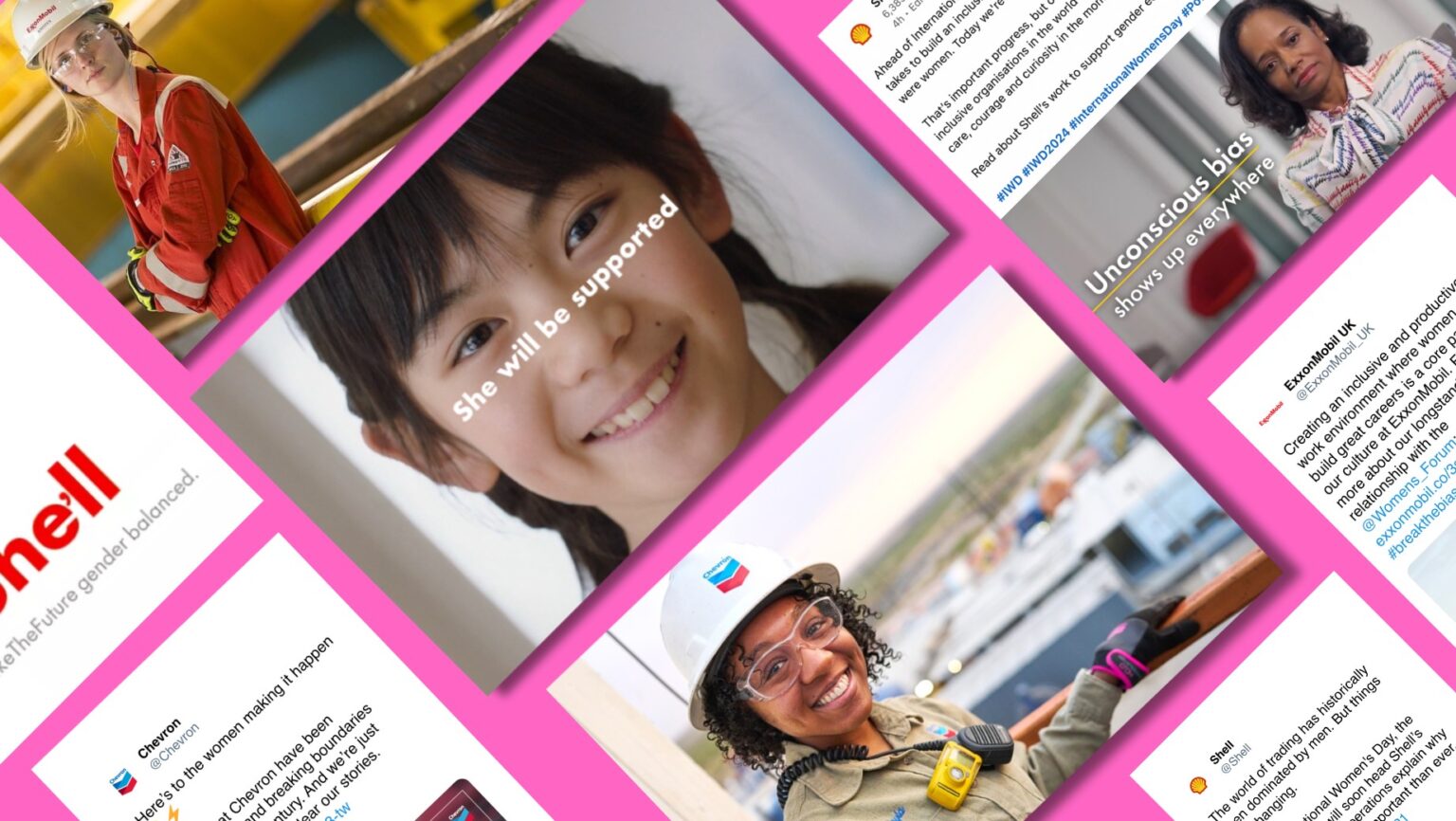In a March 7 video posted to Shell’s LinkedIn page, a woman named Kimberly says to the camera,“Unconscious bias shows up everywhere, in all forms, and it is more prevalent than any of us would like to admit.”
In the supercut of Shell employee testimonials that follow, a woman named Jane declares that “still too often, women are expected to be grateful for the opportunity to prove themselves,” and a man named Kevin admits that “when you’re part of the majority, a lot of the time you overlook it.”
Shell’s post, which bears the hashtags #InternationalWomensDay and #PoweringProgress, is the latest in a long tradition that sees the world’s fourth-largest oil and gas company pump out communications capitalising on International Women’s Day (IWD) on March 8.
It’s certainly not the only oil major that uses IWD to polish up its public image. This year, Chevron has pushed out messages on LinkedIn and in accompanying blog posts celebrating the company’s career opportunities for women in science, technology, engineering, and maths (STEM), featuring a profile of Katila Dompetelo, Chevron Angola’s first-ever forewoman.
At first glance, these ads might seem innocuous — no different from the corporate opportunism we have come to expect on International Women’s Day. “Girlboss” feminism for the age of the energy transition.
But this particular flavor of PR smoke and mirrors by the fossil fuel industry is especially questionable, since the evidence is growing that endemic sex discrimination is making climate change harder on women and girls than on men, particularly in countries with high levels of gender inequality.
Want to read more stories like this?
Sign up for our newsletter for more coverage of greenwashing by the advertising and PR industry.
The United Nations human rights body has found that women and girls are much more likely than men to be killed or displaced by climate-crisis-related disasters, particularly in countries with high levels of gender inequality. Displacement in turn makes them more vulnerable to gender-based and sexual violence.
Women and girls also face an increased risk of health problems associated with climate change, according to a meta-analysis of 130 peer-reviewed studies by Carbon Brief.
Along with burnishing their brands, the fossil fuel companies may also see these campaigns as a means to their own survival, as they struggle to recruit new talent and retain the workers they have. The number of petroleum engineering graduates in the United States plummeted 83 percent between 2017 and 2022. In a 2022 global survey of 10,000 energy professionals, 82 percent of respondents said they would consider switching out of oil and gas within the next three years.

‘Polishing Their Brand’
While ads like these suggest that women in the fossil fuel industry have limitless career potential, the reality has been different for decades. The sector is among those with the lowest percentage of female employees, and the fewest women in managerial, executive or board positions, according to a 2020 report by the International Energy Agency.
“It’s about visibility and polishing their brand, making it seem like they care about social issues,” says Silvia Pastorelli, a climate and energy campaigner with Greenpeace.
A 2022 study by InfluenceMap found that while on average, up to 60 percent of public messages by the world’s largest oil and gas companies contained “green claims,” the companies spend just 12 percent of their capital expenditures on “low-carbon” investments.
Pastorelli would like to see limits put on fossil fuel advertising that would ban these sorts of misleading ad and PR campaigns.
Even in a sea of tokenistic stunts by brands on the sole day devoted to the women’s movement, the PR and advertising tactics of oil and gas companies stand out, not only for their hollow gestures but the absurdist slogans they employ.
In one infamous 2020 campaign by Wunderman Thompson Atlanta (known today as VML, and a subsidiary of WPP), a video posted to the platform formerly known as Twitter (now X) and other social media outlets sought to align Shell with women’s liberation. The spot featured women of all ages and races staring earnestly into the camera, accompanied by written empowerment slogans like “she will be heard,” and “she will be respected.” At the end, “she’ll” morphed into “Shell,” accompanied by the hashtivist slogan: “#MakeTheFuture gender balanced.”
Instead of spreading the desired hashtag, users responded by roasting the ad, which was also derided in the ad industry trade press. Within hours, the campaign was pulled from all channels.
Shell and Wunderman Thompson were undeterred, however. Wunderman Thompson South Asia created the “Great Things Happen When We Move” video campaign for Shell India in 2021, featuring career women filling up their gas-powered vehicles at Shell stations. In 2023’s “Unique People. Powerful Together” campaign the ads platform a box-ticking, diverse selection of women who have forged successful careers at Shell.
In 2018 and 2019, McGarryBowen (part of Japan-based ad and PR giant Dentsu) created the “Thank Your Role Model” campaign for Chevron, encouraging women to film clips of themselves thanking the female mentors who helped them along the way. Aimed at recruiting more people, especially women, to pursue careers in science, technology, engineering, and maths (STEM), the campaign won an “Excellence in Marketing and Communications award from The Conference Board in 2019.
A 2019 video instalment of Exxon’s “Energy Factor” campaign featured a male employee attending the 2019 Women’s Forum, ostensibly seeking ideas for increasing employee diversity.
In 2023, an Asia-Pacific version of the campaign website marked IWD by profiling women who worked at ExxonFactor Asia Pacific. This year, an early-February post on the site featured a new YouTube video titled “Supporting Women in the Workplace: Building a Diverse Workforce at ExxonMobil.” Group SJR, a subsidiary London-based WPP was responsible for running the “Energy Factor” website on behalf of Exxon from 2019 until at least 2022.
Caroline Dennett, a former Shell safety consultant, believes that these workforce diversification campaigns are entirely self-interested. “If you look at areas like Nigeria, the people most affected by the pollution are women and yet they don’t care,” said Dennett, who in 2022 loudly ended her decade-long career at Shell over the company’s inaction on climate change.
“They do not value human life, or any other form of life on the planet,” Dennett told DeSmog. “They only care about drilling and making money.”
For in-depth profiles of advertising and PR agencies working for fossil fuel companies, please visit DeSmog’s new Advertising & Public Relations Database.
Subscribe to our newsletter
Stay up to date with DeSmog news and alerts







